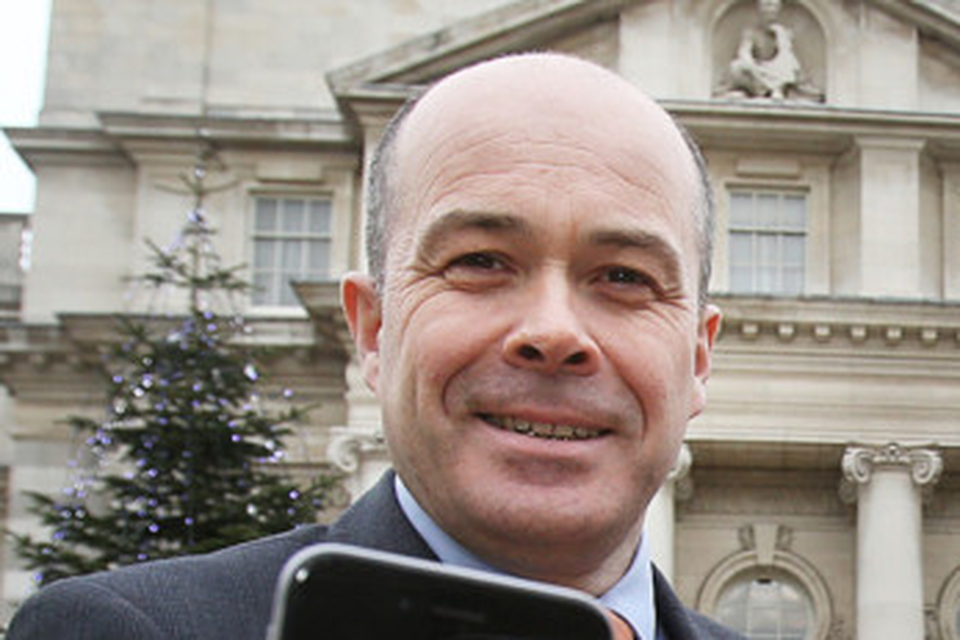Adrian Weckler: Comreg wants more power but is mired in jargon
Minister Denis Naughten
Should telecoms companies get fines up to €5m? Should Eir be split up? Should mobile coverage licences switch to geographically-based rules?
If you have views on any of this, you should pay attention to what the country's telecoms regulator has just done.
Comreg has published a document setting out what its terms should be over the next four years.
Here are three significant issues.
1. Comreg wants bigger fines and more power
In particular, the telecoms regulator says it wants a greater ability to fine telecoms companies such as Eir, Vodafone, Virgin, Three, BT and the rest. It says that some telecoms companies (though not necessarily the ones mentioned above) are deliberately flouting Ireland's laws, knowing that they'll only get a slap on the wrist.
"Serious breaches are sometimes deliberate and often affect large numbers of customers and end-users," it says. "Service providers often profit significantly, and unjustly, from breaking the law."
To this end, Comreg says that current fines are just too paltry. In 2011, they were reduced from a maximum of €5m to a maximum €500,000.
"This is too low to have a significant deterrent effect in the context of the scale of many of the operators in the telecommunications sector," Comreg says. "We consider that the previous provision for fines of up to 10pc of turnover or €5m, whichever is the higher, would be more appropriate."
Comreg shouldn't always have to go through the courts, either, it believes. It wants to be able to fine companies "administratively".
"In contrast to court-imposed financial sanctions, administrative fines can be applied immediately and thus act as a greater deterrent against breaking the law," the watchdog says. "Administrative fines enable the regulator's expertise, including its knowledge of the relevant facts and particular sectors, to be fully and proportionately utilised."
Not unexpectedly, operators aren't hugely enthusiastic about the prospect of such changes. Most feel that they are operating in tough financial circumstances where margins for traditional services are evaporating. Many harbour their own gripes against the regulator. Companies like BT and Vodafone, for example, often complain about 'light touch' application on wholesale rules regarding Eir's incumbent network which they have to use. On the other side, Eir has a longstanding beef about the relevance of what it sees as Comreg's overly-rigid interpretation of legacy universal service obligation rules in a multi-platform, multi-network broadband era.
2. It's thinking about ditching city-focused mobile coverage rules
After rural broadband, the biggest telecoms issue in Ireland is mobile coverage. And the main reason for coverage problems is that existing licences don't require geographical coverage, just population-based coverage. "ComReg will consider the use of coverage and rollout obligations," it says.
"There are certain regulatory tools available that could be used to incentivise infrastructure rollout into areas currently considered uncommercial. In this regard, ComReg observes that the propagation characteristics of the 700 MHz band are favourable to wide area coverage and that the use of coverage and a targeted coverage and rollout obligation to enhance coverage may be appropriate for this spectrum band."
This rhymes with recent comments made by Communications Minister Denis Naughten, who said he wants Ireland to become the first European country to roll out 5G mobile licences on a geographic rather than a population basis.
3. It needs to sort out its own communication problems
One of Comreg's biggest challenges is making itself more accessible. It suffers from a chronic addiction to jargon, restricted briefings and endless abbreviations. It simply doesn't explain issues as clearly as it could or should.
I have sat through joint Oireachtas committees where TDs don't have a clue about the basic differences in licensing or regulatory responsibilities. It's only partially their fault. It ironically means that Comreg's own successes go unnoticed.
For example, many people don't know that Ireland is one of the cheapest countries in Europe for mobile costs and one of the best in the western world for urban 4G access and cost. This should be attributed to Comreg's policies. But it's buried beneath a sea of confusion around coverage obligations, rollout timetables and the basic precepts of who is in charge. It needn't be like that.
Ofcom, which is Comreg's UK equivalent, does an outstanding job of making similar decisions and positions accessible and digestible to a wide audience of industry, governing interests and the public.
Join the Irish Independent WhatsApp channel
Stay up to date with all the latest news















